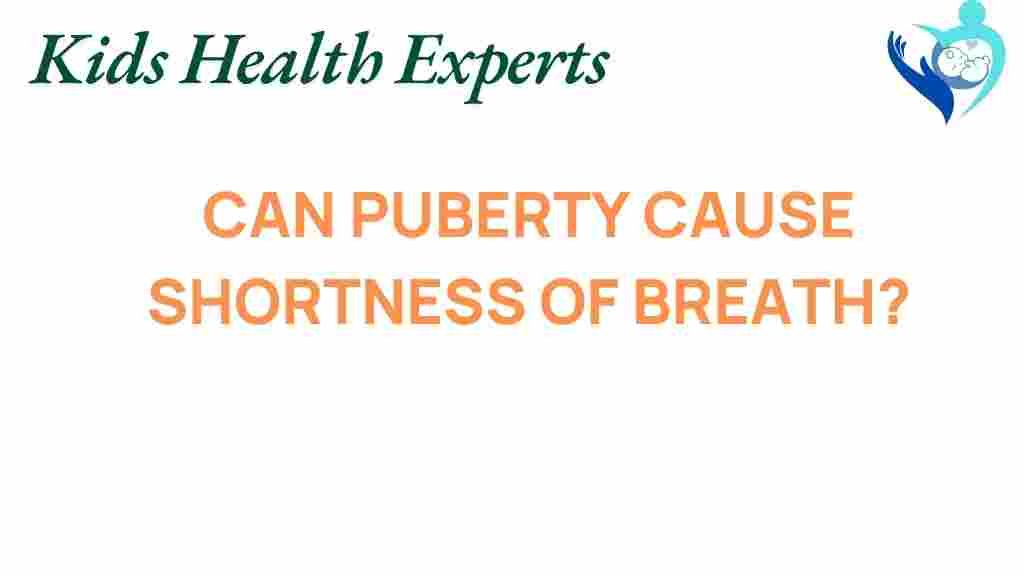Unraveling the Mystery: Can Puberty Cause Shortness of Breath?
As adolescents transition through puberty, they experience numerous physical and emotional changes. One concern that often arises during this period is shortness of breath. Parents and teenagers alike may wonder if this symptom is a normal part of puberty or if it signals a more serious issue. In this article, we will explore the relationship between puberty, adolescence, and respiratory health, while providing insights into the potential causes of shortness of breath during this critical phase of development.
Understanding Puberty and Its Effects
Puberty is a natural process that generally occurs between the ages of 9 and 14 for girls and 10 to 15 for boys. During this time, the body undergoes significant changes, including:
- Growth spurts that can affect muscle and lung development
- Hormonal changes that impact various bodily functions
- Increased emotional sensitivity and potential anxiety
These changes can sometimes lead to physical symptoms, including shortness of breath. Understanding these factors can help both teens and parents navigate this complex stage of life.
The Growth Spurt and Respiratory Changes
One of the most noticeable effects of puberty is the growth spurt. As adolescents grow rapidly, their bodies require more oxygen to support increased muscle mass and energy demands. This can sometimes result in the sensation of shortness of breath. Here’s how:
- Increased Oxygen Demand: During growth spurts, the body’s demand for oxygen rises, which can lead to feelings of breathlessness, especially during physical activities.
- Changes in Lung Capacity: As the body grows, lung capacity may take time to adjust. This adjustment period can lead to temporary shortness of breath.
Hormonal Changes and Their Impact
The hormonal changes during puberty can also affect respiratory health. Hormones such as estrogen and testosterone play vital roles in physical development and can influence the respiratory system. For example:
- Estrogen: This hormone can cause changes in the airway structure and function, potentially leading to increased sensitivity or reactivity.
- Testosterone: In boys, higher levels of testosterone can enhance muscle mass, including respiratory muscles, which may initially feel overwhelming as their body adjusts.
These hormonal shifts can contribute to feelings of anxiety, which can exacerbate shortness of breath in some adolescents.
Understanding Anxiety and Its Role in Shortness of Breath
Anxiety is a common experience during adolescence, often peaking during puberty. It can manifest physically, causing symptoms such as:
- Rapid breathing or hyperventilation
- Chest tightness
- Feelings of panic
For many teens, anxiety can trigger or heighten the perception of shortness of breath. It’s essential to recognize that while anxiety is a common aspect of teen health, it may require intervention and support.
Medical Insights on Shortness of Breath in Adolescence
While some instances of shortness of breath during puberty may be benign, it is crucial to consider potential medical conditions that could be at play. Common issues include:
- Asthma: A chronic condition that can cause wheezing, coughing, and difficulty breathing.
- Allergies: Allergic reactions can lead to respiratory distress and should be evaluated.
- Respiratory Infections: Conditions like bronchitis or pneumonia can lead to shortness of breath.
If shortness of breath is persistent, severe, or accompanied by other symptoms such as chest pain or wheezing, seeking medical advice is essential. A healthcare professional can provide guidance and appropriate testing.
Troubleshooting Shortness of Breath During Puberty
Here are some steps to consider if you or your teen are experiencing shortness of breath during puberty:
- Monitor Symptoms: Keep a diary of when the shortness of breath occurs, including activities and emotional states.
- Practice Relaxation Techniques: Deep breathing exercises and mindfulness can help alleviate anxiety-related symptoms.
- Stay Active: Regular, moderate exercise can improve overall respiratory health and reduce anxiety.
- Consult a Healthcare Provider: If symptoms persist or worsen, it’s crucial to seek professional advice.
In conclusion, experiencing shortness of breath during puberty can be a common phenomenon due to various factors, including growth spurts, hormonal changes, and anxiety. While many cases are benign, it is vital to monitor symptoms and consult with a healthcare professional if concerns arise. Understanding the interplay between adolescence and respiratory health can empower both teens and parents to navigate this challenging yet exciting stage of life.
If you want to learn more about teen health and related topics, visit this resource for further insights.
For additional information on respiratory health, please check out this external link.
This article is in the category Conditions and created by KidsHealthExperts Team

3 thoughts on “Unraveling the Mystery: Can Puberty Cause Shortness of Breath?”